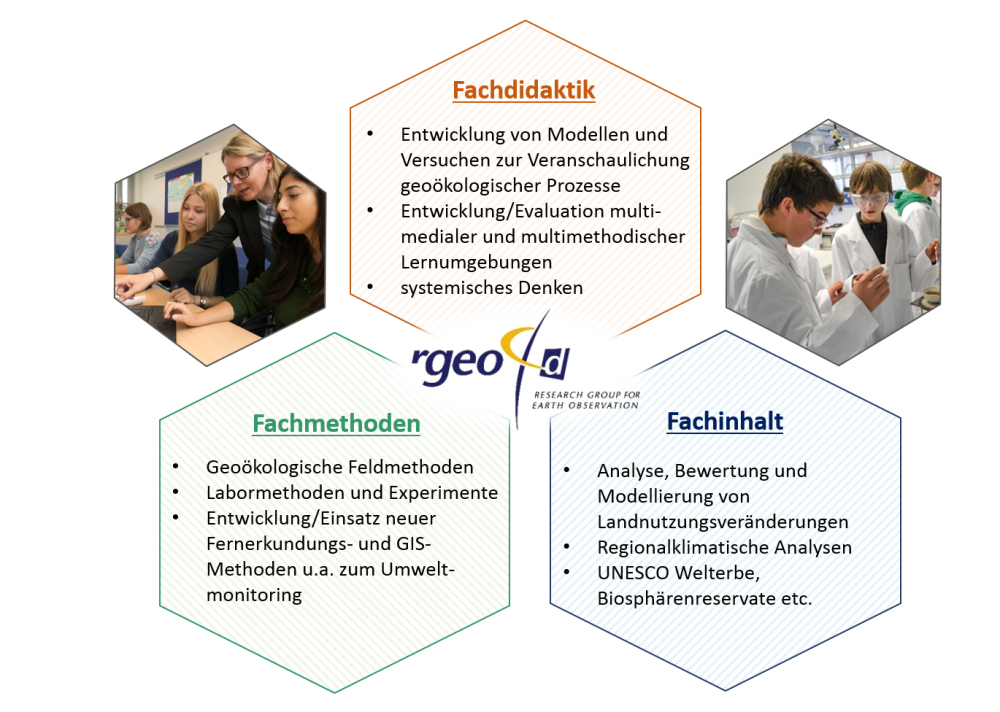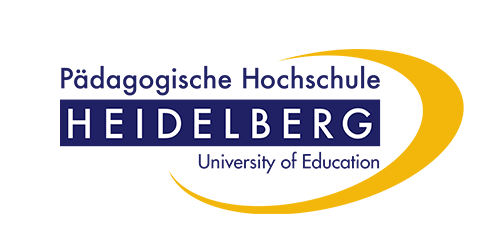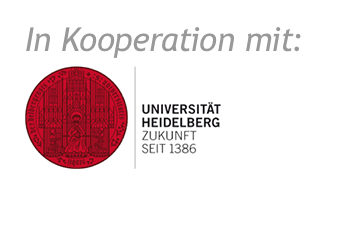Die Research Group for Earth Observation (rgeo) in der Abteilung Geographie der Pädagogischen Hochschule Heidelberg
Die Research Group for Earth Observation (rgeo) umfasst den Fachbereich „Physische Geographie und ihre Didaktik“ in der Abteilung Geographie der Pädagogischen Hochschule Heidelberg – geleitet von Prof. Dr. Alexander Siegmund. Daneben zählt zur Abteilung Geographie der Fachbereich „Humangeographie und ihre Didaktik (Prof. Dr. Klaus-Dieter Hupke).
Die aktuellen Forschungsschwerpunkte der Research Group for Earth Observation (rgeo) liegen an der Schnittstelle fachwissenschaftlicher, fachmethodischer und fachdidaktischer Aspekte.

Fachinhalt
Fachwissenschaftlich ist der Fachbereich auf die Analyse und Bewertung von Landnutzungsveränderungen sowie die Erfassung und Modellierung(z.B. regionale Klimamodelle, Szenarien der Siedlungsentwicklung) verschiedener vor allem geoökologisch relevanter Rauminformationen spezialisiert. Durch den Einsatz geoökologischer Informationssysteme (GÖKIS) werden dabei unter anderem Degenerations-, Vulnerabilitäts-, und Tragfähigkeitsuntersuchungen durchgeführt, die u.a. die Basis für die Entwicklung nachhaltiger Landnutzungskonzepte bilden. Der regionale Schwerpunkt liegt dabei neben Mitteleuropa (v.a. SW-Deutschland und Nordrhein-Westfalen) im Bereich semi-arider Inselökosysteme wie den Kanaren und Kapverden sowie Chile.
Fachmethodik
Fachmethodisch fokussieren die Forschungsvorhaben im Fachbereich der Physischen Geographie auf der Anwendung satelliten- und luftbildgestützter Fernerkundungsverfahren zum Umweltmonitoring und Geographischer Informationssysteme sowie auf der Weiterentwicklung neuer Medien im Unterricht.
Fachdidaktik
Auf fachdidaktischer Seite liegen die Arbeitsfelder, die sich thematisch v.a. auf aktuelle Mensch-Umwelt-Fragestellungen beziehen, insbesondere in der Entwicklung didaktischer Konzepte und interaktiver Arbeits- und Lernplattformen zum Einsatz digitaler Geomedien wie Satellitenbilder, Geographischer Informationssysteme etc. in der schulischen und außerschulischen Umweltbildung. Verknüpft mit adaptiven Lernumgebungen werden dabei individuelle Lernprozesse gefördert und Kompetenzen wie die Geographische Systemkompetenz gemessen. Die "GIS-Station, Kompetenzzentrum für digitale Geomedien" bündelt als außerschulischer Lernort die damit verbundenen Kompetenzen.
Einen zweiten Schwerpunkt des Fachbereichs Physische Geographie bildet der Entwurf umweltdidaktischer Konzepte und Lehr-Lern-Arrangements zum Themenkomplex Globaler Wandel. Dabei dient das abteilungseigene „Geco-Lab, Kompetenzzentrum für geoökologische Raumerkundung“ als Lehr-Lern-Labor der Untersuchung geoökologischer Zusammenhänge, aber auch der Aus- und Weiterbildung von Schülern, Studierenden, Lehrkräften und weiteren Multiplikatoren. Aus verschiedenen Forschungs- und Entwicklungsprojekten - von der Wahrnehmung von Risiken aus dem globalen Klimawandel durch Jugendlichen bis hin zur Bewertung von Anpassungsstrategien an die Folgen des regionalen Klimawandels - gehen Umweltbildungsmodule hervor, die Geländebeobachtungen, Laboranalysen und Modellexperimente vernetzen. Hier setzen verschiedene Forschungsarbeiten zur Förderung des Systemdenkens an.
Im Arbeits- und Forschungsschwerpunkt World Heritage werden die verschiedenen Kompetenzfelder der Research Group for Earth Observation (rgeo) im Bereich der Fernerkundungs- und GIS-gestützen Umweltbeobachtung (Observation) mit der Vermittlung entsprechender Erkenntnisse an Jugendliche, Multiplikatoren und Öffentlichkeit verknüpft. Die Schwerpunkte im Bereich des Fachbereichs in der Bildung für Nachhaltige Entwicklung werden zusätzlich durch eine Mitgliedschaft im interdisziplinären Institut für Naturwissenschaften, Technik, Gesellschaft (NTG) der Pädagogischen Hochschule Heidelberg und eine enge Kooperation mit dem Heidelberg Center for the Environment (HCE) der Universität Heidelberg gebündelt.

Als Research Group for Earth Observation haben wir uns in besonderem Maße SDG 4: Chancengerechte und hochwertige Bildung, und hier vor allem dem Unterziel 4.7 Bildung für Nachhaltige Entwicklung (BNE), verpflichtet. Unsere Arbeit bezieht sich aber inhaltlich auch auf eine Reihe weiterer SDGs, insbesondere SDG 11 (Nachhaltige Städte und Gemeinden), SDG 12 (Nachhaltige Konsum- und Produktionsweisen), SDG 13 (Maßnahmen zum Klimaschutz), SDG 15 (Leben an Land) und SDG 17 (Globale Partnerschaft stärken). Als UNESCO-Lehrstuhl sind wir regional einzigartig (einziger UNESCO-Lehrstuhl in Baden-Württemberg) und wirken national wie international in der Nutzung digitaler Geomedien zur Erdbeobachtung im Kontext der BNE und Erreichung der SDGs.




